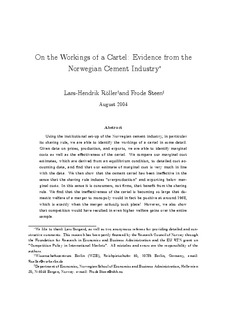On the workings of a cartel : evidence from the Norwegian cement industry
Working paper
Permanent lenke
http://hdl.handle.net/11250/162796Utgivelsesdato
2003Metadata
Vis full innførselSamlinger
- Discussion papers (SAM) [658]
Sammendrag
Using the institutional set-up of the Norwegian cement industry, in particular
its sharing rule, we are able to identify the workings of a cartel in some detail.
Given data on prices, production, and exports, we are able to identify marginal
costs as well as the effectiveness of the cartel. We compare our marginal cost
estimates, which are derived from an equilibrium condition, to detailed cost accounting
data, and find that our estimate of marginal cost is very much in line
with the data. We then show that the cement cartel has been ineffective in the
sense that the sharing rule induces ”overproduction” and exporting below marginal
costs. In this sense it is consumers, not firms, that benefit from the sharing
rule. We find that the ineffectiveness of the cartel is becoming so large that domestic
welfare of a merger to monopoly would in fact be positive at around 1968,
which is exactly when the merger actually took place! However, we also show
that competition would have resulted in even higher welfare gains over the entire sample.
Beskrivelse
Updated August 2004
Utgiver
Norwegian School of Economics and Business Administration. Department of EconomicsSerie
Discussion paper2003:25
